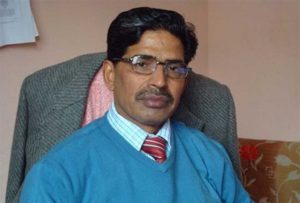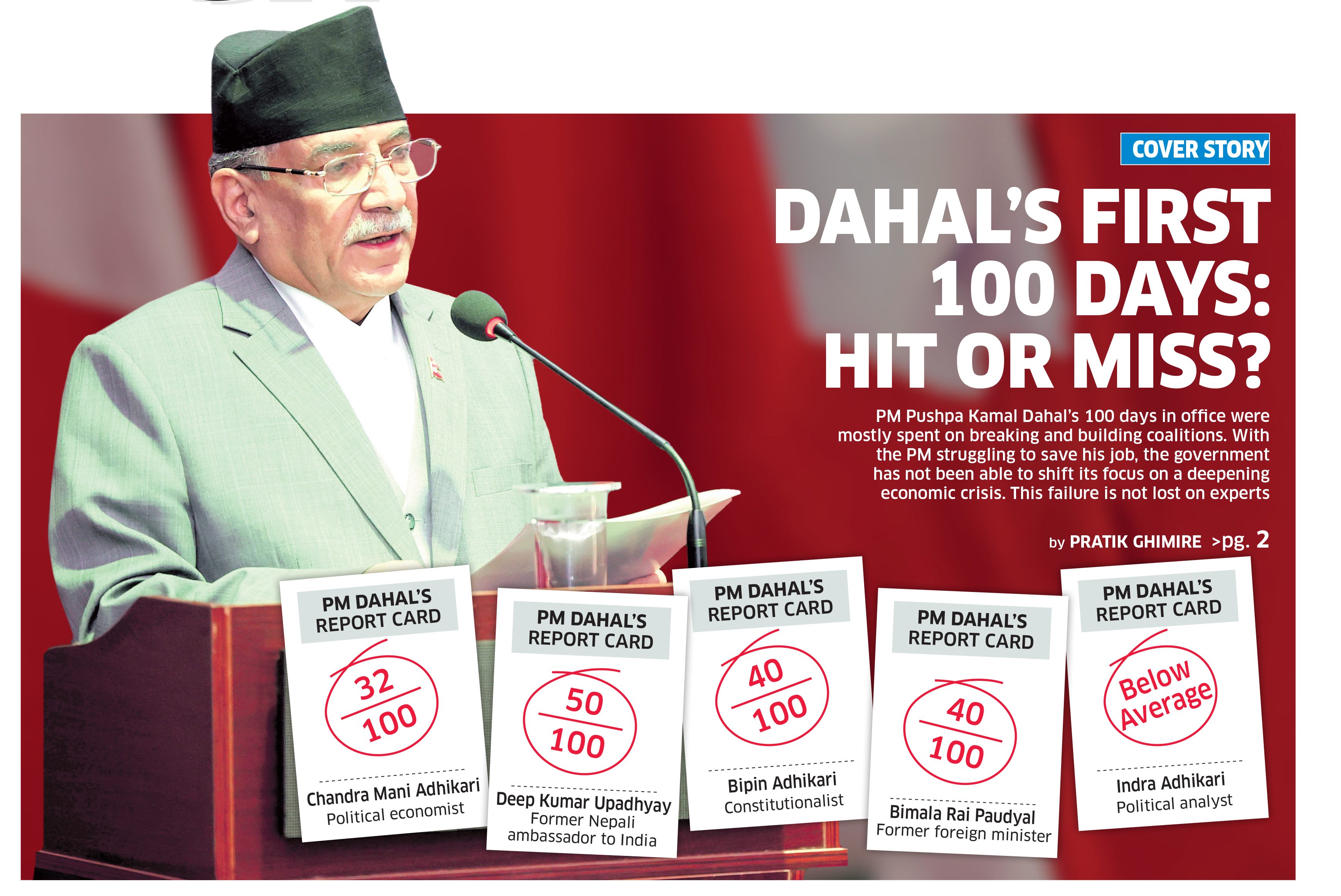Pushpa Kamal Dahal was elected to the post of prime minister for the third time on 25 Dec 2022. He won the vote of confidence on Jan 10. But within two months into the office, coalition partners CPN-UML, Rastriya Prajatantra Party, and Rastriya Swatantra Party pulled their support from the government. Dahal subsequently forged a new coalition with the Nepali Congress and took the second vote of confidence on March 20. The 100 days of Prime Minister Dahal was mainly spent on power-sharing negotiations and coalition building exercises. Governance-wise, very little was accomplished, as several ministries were without ministers for a long time. In this context,
Pratik Ghimire of ApEx asked some experts and politicians to grade the performance of Prime Minister Dahal out of 100 marks.
Chandra Mani Adhikari, Political economist

32 out of 100
Prime Minister Dahal spent most part of the past 100 days managing the expectations of the ruling parties and in power-sharing negotiations. While he did make time to meet with economists and businesspersons to discuss the country’s economic problems, he didn’t take any initiative to introduce plans and policies to fix them. This is an unusual situation. Inflation is on the rise, imports and exports are down, production is low, and people's purchasing power have decreased. The government should already have come up with a new budget and published its plans and policies to address the ongoing economic crisis. Now the Ministry of Finance, and the National Planning Commission has a lot of work to do in a short period of time, and with limited resources. Many regular programs are behind schedule. I can’t give Prime Minister Dahal and his government more than the pass marks. I am giving him the pass marks only because the prime minister has assured the business community that he will make things better.
Deep Kumar Upadhyay, Former Nepali ambassador to India

50 out of 100
The government has not appointed its foreign minister yet. This is definitely not a good sign for our foreign relations and policy. Prime Minister Dahal didn’t go to the Boao forum, and he is planning for an official visit to India, which seems immature because there hasn’t been any preparations. This government has not done any work worth appreciating so far. This is the time to work, not talk. I hope the government will focus on its work. The political parties are busy breaking and making coalitions. The Cabinet was expanded after so much political drama, but some important ministries are still vacant. The parties don’t know how to work, and they are blaming one another. Youths these days laugh at and mock politicians and ministers. Why? Because they have no hope from them. We are yet to see what type of common minimum program this government will bring to deal with the challenges facing the country. So I am still willing to give this government the benefit of doubt, and give it 50 out of 100 marks.
Bipin Adhikari, Constitutionalist

40 out of 100
The 100 days of the Dahal-led government was marked with desperation. Prime Minister Dahal spent most of the time scrambling to restore stability to his government because his coalition partners backed out within months. The government coalition changed twice in the past 100 days, and Dahal had to take the floor test as many times. The government is still not stable. Parties are joining and leaving the government, and the Cabinet expansion process is still ongoing. There has been no socioeconomic progress at all. One can’t even say if the situation has gone bad or worse, because the government has not done any work yet. There has been no preparations whatsoever to prevent the imminent economic downfall. The government is also planning to award India a new hydropower construction project during Prime Minister Dahal’s visit. This is not a good idea, as India has been unable to deliver other projects within deadline. This has not been a good start for Dahal. I give him and his government 40 out of 100, assuming that 40 is the pass mark. I am giving the pass mark because there is law, order and peace in the country, and there hasn’t been any major legal controversy.
Bimala Rai Paudyal, Former foreign minister

40 out of 100
In the initial days, the government was working at a full pace. I can attest this with my own experience as a former minister of this government. Prime Minister Dahal used to promptly sign the files forwarded by my ministry. But as soon as the disputes over the presidential polls started, the prime minister’s engagement shifted toward forming a new coalition, rather than focusing on government work. He began delaying the approval of files. And after the UML, RPP and RSP left the government, Prime Minister Dahal delayed the expansion of the Cabinet. For a long time, he kept several ministry portfolios to himself. I know how much work a full-time minister has to do in a day, so there is no way one individual could handle the work of 16 ministries. Naturally, the government was unable to focus on service delivery. But I must say that the Ministry of Communication, and the Ministry of Agriculture did perform well during the initial days of this government. I give this government 40 out of 100 marks, hoping it will start performing.
Indra Adhikari, Political analyst

Below average
I can’t say that this government has not got a passing mark, because there is at least a legitimate government in place. So, the government has passed the exam already, although its performance so far has been below average. The 100 days of Prime Minister Dahal was mainly focused on survival and forming a stable coalition. So when the time came for Cabinet expansion, the political parties were not looking for leaders who could deliver, but someone whose appointment could balance the government. The Cabinet expansion delay has also shown us that there is no organizational structure and system in place to keep our bureaucracy functioning smoothly. Though there are certain rights that the bureaucracy can utilize for service delivery, it has not been using these rights. Our bureaucracy has the tendency of waiting and looking for ministers to show the way. As the Cabinet expansion was delayed, the ministries without ministers could not perform their tasks, which affected the overall service delivery.












